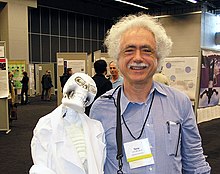Terry Winograd
| Terry Winograd | |
|---|---|
 |
|
| Born |
February 24, 1946 Takoma Park, Maryland, USA |
| Institutions |
Stanford University |
| Alma mater | Massachusetts Institute of Technology |
| Thesis | Procedures as a Representation for Data in a Computer Program for Understanding Natural Language (1971) |
| Academic advisors | Seymour Papert |
| Doctoral students | Michelle Baldonado Alan Borning Steve Cousins François Guimbretiere Frances James Manu Kumar Daniel Maynes-Aminzade Meredith Ringel Morris Doantam Phan Roland Roscheisen Stuart Shieber |
| Other notable students |
Sergey Brin Larry Page |
| Known for |
Blocks world SHRDLU Language/action perspective |
| Notable awards | IJCAI Computers and Thought Award |
|
Website hci |
|
Terry Allen Winograd (born February 24, 1946) is an American professor of computer science at Stanford University, and co-director of the Stanford Human-Computer Interaction Group. He is known within the philosophy of mind and artificial intelligence fields for his work on natural language using the SHRDLU program.
Winograd grew up in Colorado and graduated from Colorado College in 1966. He wrote SHRDLU as a PhD thesis at MIT in the years from 1968-70. In making the program Winograd was concerned with the problem of providing a computer with sufficient "understanding" to be able to use natural language. Winograd built a blocks world, restricting the program's intellectual world to a simulated "world of toy blocks". The program could accept commands such as, "Find a block which is taller than the one you are holding and put it into the box" and carry out the requested action using a simulated block-moving arm. The program could also respond verbally, for example, "I do not know which block you mean." The SHRDLU program can be viewed historically as one of the classic examples of how difficult it is for a programmer to build up a computer's semantic memory by hand and how limited or "brittle" such programs are.
In 1973, Winograd moved to Stanford University and developed an AI-based framework for understanding natural language which was to give rise to a series of books. But only the first volume (Syntax) was ever published. "What I came to realize is that the success of the communication depends on the real intelligence on the part of the listener, and that there are many other ways of communicating with a computer that can be more effective, given that it doesn’t have the intelligence."
His approach shifted away from classical Artificial Intelligence after encountering the critique of cognitivism by Hubert Dreyfus and meeting with the Chilean philosopher Fernando Flores. They published a critical appraisal from a perspective based in phenomenology as Understanding Computers and Cognition: a new foundation for design in 1987. In the latter part of the 1980s, Winograd worked with Flores on an early form of groupware. Their approach was based on conversation-for-action analysis.
...
Wikipedia
